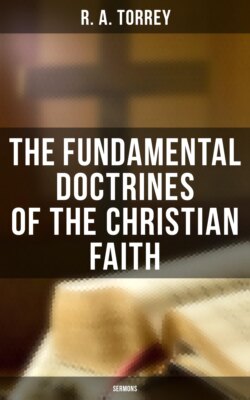Читать книгу The Fundamental Doctrines of the Christian Faith (Sermons) - R. A. Torrey - Страница 19
На сайте Литреса книга снята с продажи.
II. THERE IS ONE GOD
ОглавлениеTable of Contents
One more fact about the Christian conception of God remains to be mentioned and that is: There is but one God. The Unity of God comes out again and again in both the Old Testament and the New. For example, we read in Deut. 4:35: "Jehovah he is God. There is none else beside him." And in Deut. 6:4 we read: "Hear O Israel: Jehovah our God is one Jehovah." Turning to the New Testament in 1 Tim. 2:5 we read: "There is one God, one mediator also between God and man, himself man, Christ Jesus." And in Mark 12:29 our Lord Jesus Himself says: "Hear O Israel, the Lord our God, the Lord is one."
But we must bear in mind the character of the Divine Unity. It is clearly revealed in the Bible that in this Divine Unity, in this one Godhead, there is a multiplicity of persons. This comes out in a variety of ways.
1. First of all, the Hebrew word translated "One" in these various passages given denotes a compound unity, not a simple unity. (Cf. 1 Cor. 3:6-8; 1 Cor. 12:13; John 17:22, 23; Gal. 3:28.)
2. In the second place, the Old Testament word most frequently used for God is a plural noun. The Hebrew grammarians and lexicographers tried to explain this by saying that it was the "pluralis majestatis," but the very simple explanation is that the Hebrews, in spite of their intense monotheism, used a plural name for God because there is a plurality of persons in the one Godhead.
3. More striking yet, as a proof of the plurality of persons in the one Godhead, is the fact that God Himself uses plural pronouns in speaking of Himself. For example, in the first chapter of the Bible, Gen. 1:26, we read that God said: "Let us make man in our image, after our likeness." And in Gen. 11:7, He is further recorded as saying: "Go to, let us go down, and there confound their language, that they cannot understand one another's speech." In Gen. 3:22 we read: "And Jehovah God said, Behold, man is become as one of us to know good and evil." And in that wonderful vision to which reference has already been made, in which Isaiah saw Jehovah, we read this statement of Isaiah's in Isa. 6:8: "And I heard the voice of the Lord, saying, Whom shall I send, and who will go for us? Then said I, Here am I; send me."
4. Another illustration of the plurality of persons in the one Godhead in the Old Testament conception of God is found in Zech. 2:10, 11; where Jehovah speaks of Himself as sent by Jehovah in these words: "Sing and rejoice, O daughter of Zion; for, lo, I come, and I will dwell in the midst of thee, saith Jehovah. (11) And many nations shall join themselves to Jehovah in that day, and shall be my people and I will dwell in the midst of thee, and thou shalt know that Jehovah of hosts hath sent me unto thee." Here Jehovah clearly speaks of himself as sent by Jehovah, thus clearly indicating two persons in the Deity.
5. Another indication of the plurality of persons in the Godhead in the Old Testament conception of God is found in the fact that "The Angel of Jehovah" in the Old Testament is at the same time distinguished from and identified with Jehovah.
6. This same thought of the plurality of persons in the one Godhead is brought out in John 1:1, where we reach the very climax of this thought. Here we are told in so many words: "In the beginning was the word and the word was with God and the word was God." We shall see later, when we come to study the Deity of Christ and the Personality and Deity of the Holy Spirit, that the Lord Jesus and the Holy Spirit are clearly designated as divine beings and at the same time distinguished from one another, and from God the Father. So it is clear that in the Christian conception of God while there is but one God there is a multiplicity of persons in the one Godhead.
In these two sermons on "The Christian Conception of God" we have very inadequately stated that conception. This conception of God runs through the whole Bible from the first chapter of the book of Genesis to the last chapter of Revelation, and this is one of the many marvellous illustrations of the divine unity of the Book. How wonderful is that Book, in that there is this unity of thought on this very profound doctrine pervading the whole book! It is a clear indication that the Bible is the Word of God. There is in the Bible a profounder philosophy than is found in any human philosophy, ancient or modern, and the only way to account for it is that God Himself is the author of this incomparable philosophy. What a wondrous God we have! How we ought to meditate upon His person! With what awe and at the same time with what delight we should come into His presence and bow before Him in adoring contemplation of the wonder and beauty and majesty and glory of His being!
